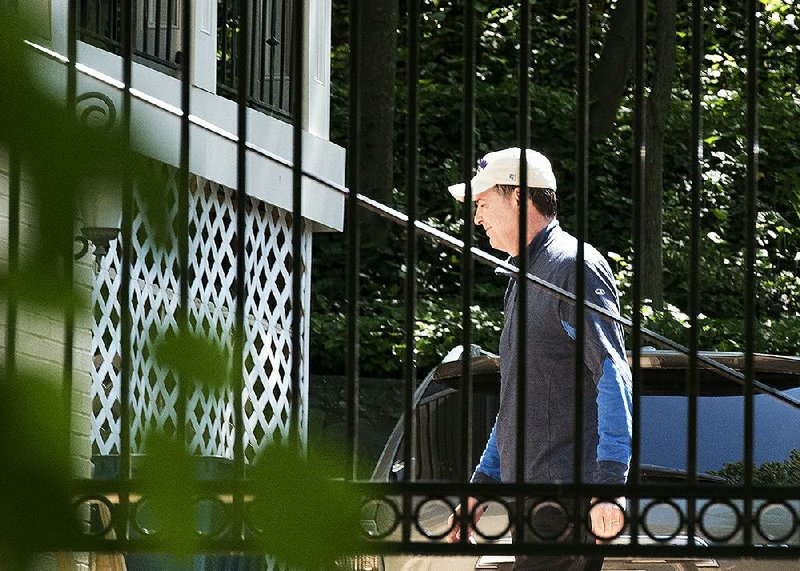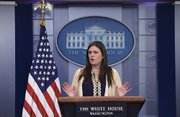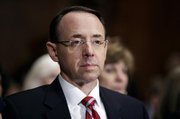WASHINGTON -- Days before he was fired by President Donald Trump, FBI Director James Comey requested more resources to pursue his investigation into Russia's election meddling and the possible involvement of Trump associates, U.S. officials said Wednesday.
RELATED ARTICLES
http://www.arkansas…">Firing, Russia-probe uncertainty add to FBI gloom http://www.arkansas…">State's senators want answers
It was unclear whether word of Comey's request to Deputy Attorney General Rod Rosenstein ever made it to Trump.
Trump is the first president since Richard Nixon to fire a law enforcement official overseeing an investigation with ties to the White House. Democrats quickly accused Trump of using Comey's handling of the Hillary Clinton email investigation as a pretext for the firing and called for a special prosecutor for the Russia probe. Republican leaders brushed off the idea as unnecessary.
Defending the firing, White House officials said Trump's confidence in Comey had been eroding for months. They suggested that Trump took action after he was persuaded by Justice Department officials and received a Rosenstein memo that criticized Comey's role in the Clinton investigation.
[INTERACTIVE TIMELINE: Events leading up to Comey's firing]
"Frankly, he'd been considering letting Director Comey go since the day he was elected," White House spokesman Sarah Huckabee Sanders said, a different explanation from the day before, when officials put the emphasis on new Justice Department complaints about Comey.
Trump's action left the Russia probe in limbo. The president has denied any ties to Russia or knowledge of campaign coordination with Russia.
Trump was to meet Wednesday with Andrew McCabe, acting director of the FBI, to discuss morale at the agency, Sanders said. She added that Trump would offer to visit he FBI if McCabe believed it would help morale there.
Trump promised to appoint a credible successor to Comey, but he gave no indication of when he would do so or who it would be. Any nominee will require confirmation by the Senate.
[PRESIDENT TRUMP: Timeline, appointments, executive orders + guide to actions in first 100 days]
"James Comey will be replaced by someone who will do a far better job, bringing back the spirit and prestige of the FBI," Trump wrote Wednesday morning.
"President Trump wants an FBI director who is impartial, who's not politicized and who has the confidence and trust" of the agency staff and Republicans and Democrats, White House counselor Kellyanne Conway said.
Sanders said the White House would "encourage" the next FBI chief to complete the Russia investigation.
"Nobody wants this to be finished and completed more than us," she said.
Ahead of the firing
In defending the decision, White House officials leaned heavily on the memo from Rosenstein.
But Rosenstein's role in Comey's firing became increasingly murky Wednesday.
Three U.S. officials said Comey recently asked Rosenstein for more manpower to help with the Russia investigation. Sen. Dick Durbin, D-Ill., said that while he couldn't be certain that the request triggered Comey's dismissal, he believed the FBI "was breathing down the neck of the Trump campaign and their operatives, and this was an effort to slow down the investigation."
Justice Department spokesman Sarah Isgur Flores denied that Comey had asked Rosenstein for more resources for the Russia investigation.
Trump advisers said the president met with Rosenstein, as well as Attorney General Jeff Sessions, on Monday after learning that they were at the White House for other meetings. One official said Trump asked Rosenstein and Sessions for their views on Comey, then asked the deputy attorney general to synthesize his thoughts in a memo.
The president fired Comey the next day. The White House informed Comey by sending him an email with several documents, including Rosenstein's memo.
It's unclear whether Rosenstein was aware that his report would be used to justify Comey's ouster.
White House and other government officials insisted on anonymity to disclose private conversations.
The president kept a low profile Wednesday. The only event on his public schedule was his meeting with Russian Foreign Minister Sergey Lavrov in the Oval Office. Among those participating in the meeting were Russian Ambassador to the U.S. Sergei Kislyak, whose contacts with Trump advisers are being scrutinized by the FBI, and Henry Kissinger, who served as Nixon's secretary of state.
In brief remarks to reporters, Trump said he fired Comey because "he wasn't doing a good job. Very simply. He was not doing a good job."
As a candidate, Trump cheered Comey's tough stance on Clinton's use of a personal email and private Internet server during her tenure as secretary of state. He also applauded Comey's decision to alert Congress about potential new evidence in the case 10 days before the presidential election -- an announcement that many Democrats blame in part for Trump being elected.
White House officials Wednesday morning worked to explain Trump's decision to fire Comey. In a testy exchange on CNN, Conway denied suggestions that Trump was trying to interfere with the Russia investigation. "The idea that you think this is about Russia and not about an FBI director who just yesterday forced his bureau to correct sworn testimony," she said before being interrupted by CNN host Chris Cuomo.
Comey testified mistakenly before a Senate committee on May 3 that Huma Abedin, a top adviser to Clinton, had "forwarded hundreds of thousands" of emails to her husband's laptop. The FBI clarified Tuesday that the emails included some that were backed up manually, not just ones that were forwarded. Cuomo expressed skepticism that Trump fired Comey out of concern for Abedin.
"This is a president who saw that the FBI director had lost the public confidence of Republicans and Democrats," Conway said.
Sanders, meanwhile, attributed Trump's shift on Comey to the difference between being a candidate and president. She said Trump became concerned about Comey's efforts to work outside the Justice Department's chain of command during the Clinton investigation, citing congressional testimony from last week that provided more details of his actions last year.
Yet as recently as last week, White House spokesman Sean Spicer said Trump had "confidence" in Comey.
Vice President Mike Pence also addressed the subject Wednesday morning during a visit to Capitol Hill.
"This administration is very confident that with the appointment of a new director of the FBI, because of the president's strong leadership, we will be able to get this nation's leading law enforcement agency a fresh start," Pence told reporters. "Because of the president's decisive action yesterday to restore the confidence and trust of the American people, we have an opportunity for a new beginning with the FBI."
Pence repeated Trump's claim that Comey informed the president several times that the president was "not under investigation." The White House has not substantiated that claim.
Meanwhile, a farewell letter from Comey that circulated among friends and colleagues said he does not plan to dwell on the decision to fire him or on "the way it was executed."
He said in the letter that although he'll be fine, he will miss the FBI and its mission "deeply." Comey said that "in times of turbulence, the American people should see the FBI as a rock of competence, honesty, and independence."
He also said "it's very hard to leave a group of people who are committed only to doing the right thing."
The letter was posted online by CNN on Wednesday night. A person who had seen the note confirmed the online version as authentic.
Call for inquiry
Democrats, meanwhile, called anew for an independent investigation into the Trump campaign's possible ties to Russia's election interference, and were supported by a handful of prominent Republican senators.
Sen. Mark Warner of Virginia, the top Democrat on the Intelligence Committee, suggested that the Senate refrain from confirming a new director of the FBI until a special prosecutor is named. Democrats would need at least some Republicans to concur with that plan, and so far none has committed to do so.
But Senate Majority Leader Mitch McConnell, with the support of the White House, brushed aside those calls, saying a new investigation would only "impede the current work being done."
"Our Democratic colleagues [are] complaining about the removal of an FBI director whom they themselves repeatedly and sharply criticized," he said on the Senate floor. "That removal is being done by a man, Rod J. Rosenstein, who they repeatedly and effusively praised."
The firing "is not going to stop the Russia investigation," Sen. Lindsey Graham, R-S.C., said, noting that if Trump believed that to be the case, "he made a big mistake because the investigation will go forward."
Sen. Richard Burr, R-N.C. and chairman of the Intelligence Committee, was among a handful of Senate Republicans who appeared to break ranks with the administration, at least to a degree, questioning the timing and rationale of Trump's decision.
"The timing of this and the reasoning for it doesn't make sense to me," Burr said Wednesday, adding that the firing could complicate his panel's investigation of Russian interference in the election. "This made our task a little more difficult, but it didn't make it impossible," he said, adding, "The investigation will run its course."
Warner said he and Burr invited Comey to testify before their committee next Tuesday. "We've not heard back," Warner told MSNBC. "My hope is that he [Comey] will take advantage of this opportunity."
The president relied largely on Twitter to defend his actions. In a series of morning tweets, he said both Democrats and Republicans "will be thanking me."
"The Democrats have said some of the worst things about James Comey, including the fact that he should be fired, but now they play so sad!" Trump wrote.
"Comey lost the confidence of almost everyone in Washington, Republican and Democrat alike," he added in another post.
He went on to highlight Comey's "scandals" and suggested that a Democratic senator be investigated moments after that senator appeared on television condemning the president's action.
Sen. Richard Blumenthal, D-Conn., was speaking on CNN as Trump went after him on Twitter for embellishing his Vietnam War record during his 2010 election campaign.
The president was referring to an article in The New York Times in 2010, when Blumenthal first ran for the Senate. The story said Blumenthal had presented himself as a Vietnam veteran when in fact he served in the Marine Reserve at home and never went to war.
Blumenthal said he was unswayed by Trump's tweets. "His bullying won't silence my call for an independent prosecutor," he said.
"I disagreed with James Comey in some of the decisions, but I never advocated he be fired," Blumenthal said. "What we have now really is a looming constitutional crisis that is deadly serious because there is an investigation that is ongoing."
Trump is only the second president to fire an FBI director. President Bill Clinton dismissed William Sessions over allegations of Sessions' ethical lapses in 1993. Nixon, in 1973, fired an independent special prosecutor, Archibald Cox, who was running the Watergate investigation that ultimately led to Nixon's downfall.
Information for this article was contributed by Julie Pace, Darlene Superville, Ken Thomas, Vivian Salama, Catherine Lucey and Eric Tucker of The Associated Press; by Michael D. Shear, Peter Baker, Jennifer Steinhauer, Matt Flegenheimer, Thomas Kaplan, Eric Lipton and Robert Pear of The New York Times; and by Elise Viebeck, Ed O'Keefe, Sean Sullivan, Paul Kane, Karoun Demirjian and Kelsey Snell of The Washington Post.
A Section on 05/11/2017



